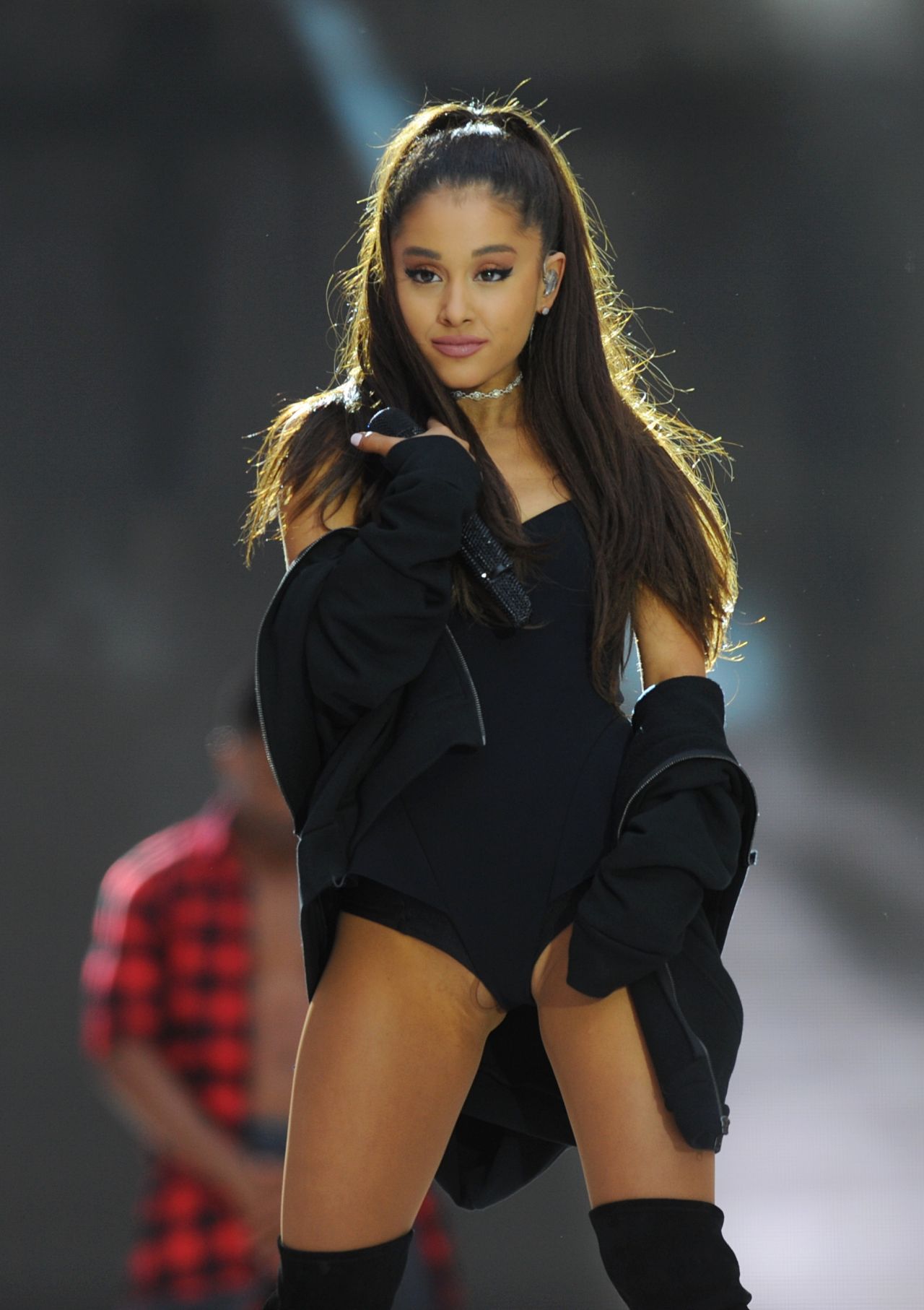Ariana Grande Nude Photo Leak: What You Need To Know
Is fame a double-edged sword, forever exposing vulnerabilities? The relentless glare of the public eye, particularly in the age of the internet, has transformed into a magnifying glass, scrutinizing every aspect of a celebrity's life, with privacy often becoming a forgotten casualty.
The digital echo chamber, where rumors amplify and speculation thrives, can swiftly transform into a crucible of controversy. The rise of social media and the proliferation of online platforms have created an environment where private moments can be exposed, manipulated, and disseminated with alarming speed. It is a reality that impacts the world's most recognizable figures, with the scrutiny often extending to personal matters, leaving many vulnerable to exploitation and reputational damage. The incident is a stark reminder of the dangers inherent in the digital age, where the boundaries of privacy are constantly being redefined, and the consequences of online breaches can be severe. The discussion invariably circles back to the ethics of media consumption and the responsibilities of individuals in a world where information, both true and fabricated, spreads at an unprecedented rate. The core issue at hand is a testament to the inherent challenges faced by those in the public eye.
The story of Ariana Grande, an individual known for her musical prowess and public persona, serves as a case study of the challenges faced. Accusations of leaked private images, whether genuine or fabricated, often lead to widespread dissemination and speculation, which can be intensely disturbing and damaging. While the artist confirmed some reports that were fake, the mere perception of a breach can trigger a sequence of reactions, from public comments to legal proceedings. It also forces a dialogue on the standards of digital security. These cases often highlight the tension between freedom of information and the right to personal privacy.
| Category | Details |
|---|---|
| Full Name | Ariana Grande-Butera |
| Date of Birth | June 26, 1993 |
| Place of Birth | Boca Raton, Florida, U.S. |
| Occupation | Singer, Songwriter, Actress, Producer |
| Years Active | 2008present |
| Notable Achievements | Multiple Grammy Awards, Billboard Music Awards, MTV Video Music Awards, American Music Awards. Numerous chart-topping singles and albums. |
| Associated Acts | Various collaborations with other artists, including but not limited to, The Weeknd, Justin Bieber, and many more. |
| Net Worth (estimated) | $250 million (as of 2024 - varies based on sources) |
| Official Website | https://www.arianagrande.com/ |
The reported hacking campaigns and subsequent dissemination of alleged private images are a serious matter. Regardless of the truth of the photos in question, the issue of unauthorized access to private information and the potential for widespread distribution raises fundamental concerns about digital security and the protection of personal data. These incidents highlight the vulnerability of even high-profile individuals to cyberattacks and the need for enhanced security measures and legal frameworks to safeguard personal privacy in the digital realm.
The aftermath of such events often leads to an exploration of the legal and ethical implications. Defamation laws, intellectual property rights, and the right to privacy are all brought into the forefront. The process also necessitates a re-evaluation of the social responsibility of media outlets and individuals in the dissemination of potentially harmful content. The question of whether the public has a right to access information, regardless of its origins, is constantly at the center of these debates.
The statements from the involved parties, such as Ariana Grande's denial of the authenticity of the images, are crucial. These pronouncements not only attempt to defend the individual's reputation but also help to define the narrative and influence public opinion. The manner in which these claims are communicated, through official channels or directly to the media, plays a vital role in managing the fallout and controlling the spread of misinformation.
The investigation into the alleged hacking and the subsequent leaks serves as an important component of the overall narrative. Law enforcement and digital security specialists have a responsibility to determine the source of the breach, identify those responsible, and work towards preventing similar incidents from happening again. The results of these investigations are critical to either confirming or refuting the initial reports and providing a measure of justice for the victims. The details unearthed during such inquiries can help to reinforce the importance of digital security and the consequences of privacy breaches.
The contrasting responses from various public figures also add another layer to the complexity of these events. While some may remain silent, others choose to address the situation directly, offering support and speaking out against the violations. The varying strategies taken by individuals in the public eye also influence the overall public perception of the events and the individuals involved. Public figures can choose to take legal action and fight for their privacy, they can also opt to take a more forgiving approach and use their platform to address issues of privacy.
The public's response to events like these reveals a great deal about societal attitudes towards privacy, celebrity culture, and the influence of social media. The speed with which rumors spread and the intensity with which people react demonstrate the influence that digital platforms have on shaping public opinions. The reactions can vary greatly, ranging from supportive and empathetic to highly critical and speculative. The discourse that surrounds events involving celebrities reflects a broader conversation about personal privacy and the pressures of living under public scrutiny.
The role of media outlets, both traditional and digital, is constantly being scrutinized. The ethical considerations of reporting on these events and the balance between informing the public and protecting the privacy of individuals are often at the center of debate. Different news organizations may take varied approaches to coverage, choosing how to report on the alleged leaks, the responses from the involved individuals, and the larger implications for digital security. The decisions made by these outlets often shape public opinion and inform the way the story is understood.
The legal aspects, including the possibility of lawsuits and the pursuit of those responsible for the alleged hacks, must be acknowledged. Lawsuits for defamation, invasion of privacy, and other offenses can result from such incidents, particularly if the leaked images are found to be fabricated or if the dissemination of private information causes harm. The legal proceedings can be long and complex, and they can have a significant impact on the individuals involved, both personally and professionally. The outcomes of such cases often set precedents and contribute to the ongoing discourse surrounding privacy rights in the digital age.
The ethical considerations, including the responsibility to respect the privacy of others and the potential consequences of sharing personal information online, are important. These considerations extend to both the media and the general public, urging them to act responsibly and to think carefully before sharing or commenting on potentially sensitive material. The ethical decisions are frequently debated in the wake of such events, leading to a greater awareness of the significance of ethical conduct in the digital world.
Ultimately, the narrative surrounding the alleged leaks and the responses from the involved parties are about more than just the individuals involved. They are about the broader issues of privacy, digital security, the influence of social media, and the responsibilities of both individuals and institutions in the digital age. The incidents, whatever their nature, offer a chance to look at the challenges and complexities of living in the public eye and to consider how society can better protect the privacy of individuals in an increasingly interconnected world.



Detail Author:
- Name : Johnny Windler
- Username : lmiller
- Email : sturner@yahoo.com
- Birthdate : 1995-10-14
- Address : 278 Lynch Terrace East Samanthaburgh, ME 08739
- Phone : +1-260-771-3690
- Company : Bartoletti-Romaguera
- Job : Public Transportation Inspector
- Bio : Neque aspernatur aut rerum qui dignissimos quo sunt. Numquam neque debitis natus sapiente suscipit omnis nulla. Dignissimos amet cupiditate eos. In saepe exercitationem quam vero ut error vel.
Socials
twitter:
- url : https://twitter.com/mills2010
- username : mills2010
- bio : In et dolores non velit asperiores alias neque. Hic omnis ipsam ipsam perspiciatis.
- followers : 2204
- following : 2806
linkedin:
- url : https://linkedin.com/in/howard_id
- username : howard_id
- bio : Et ipsum eaque unde ullam quas non.
- followers : 3673
- following : 1973
facebook:
- url : https://facebook.com/howard_xx
- username : howard_xx
- bio : Nostrum voluptatem aliquam et aut. Eos repudiandae dolore qui qui.
- followers : 2817
- following : 2044
instagram:
- url : https://instagram.com/howard.mills
- username : howard.mills
- bio : Nulla voluptatibus odio inventore voluptatibus. Recusandae minima accusantium officiis in.
- followers : 1315
- following : 1888